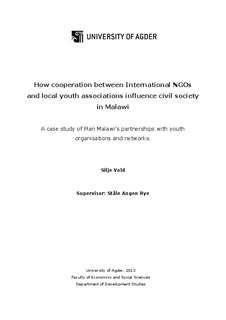How cooperation between international NGOs and local youth associations influence civil society in Malawi : a case study of Plan Malawi's partnerships with youth organizations and networks
Master thesis
Permanent lenke
http://hdl.handle.net/11250/135283Utgivelsesdato
2013Metadata
Vis full innførselSamlinger
Sammendrag
There is a significant focus within development aid on the importance of civil society for democracy and development, and resources are channelled towards INGOs with the aim of them contributing to “strengthening” local civil society. The literature is however critical and inconclusive when it comes to the impact of such efforts (Riddell, 2007), and there is debate as to whether the idea of “civil society” is relevant in a developing country context (Whaites, 2000). Further, there is a lack of research on the role of youth within development and civil society, despite the fact that the global numbers of youth have reached its highest in history, and most of them live in developing countries (World Bank, 2006, pp. 4–5). This shows the need for more research into efforts to strengthen civil society in developing countries, and the
role of youth within these efforts. This study is applying a qualitative methodology, using Plan Malawi and a set of local youth
associations they work with as a case study. The data generated through interviews and focus group discussions are analysed through a theoretically informed thematic analysis, focusing on how to understand civil society in Africa and Malawi, and civil society as an arena for participation, the promotion of accountability, and the creation of social capital. The analysis shows that efforts to strengthen local civil society through aid may be limited or even undermined by aid itself, because of the mechanisms inherent in the aid system, and how aid influences the motivations of actors within civil society. This can be seen in four distinct ways. Firstly, aid may lead to the strengthening of particular actors within civil society according to criteria set by donors, and also reinforce their dependence on aid. Secondly, youth participation initiatives risk becoming forms of manipulation, due to the cultural, historical, political and economic context. Thirdly, efforts to enhance accountability through aid may be undermined by the overwhelming focus on accountability towards donors. Finally,
competition for aid may hinder cooperation and trust within civil society, hence undermining the creation of social capital.
Beskrivelse
Master thesis in development management - University of Agder 2013
